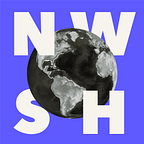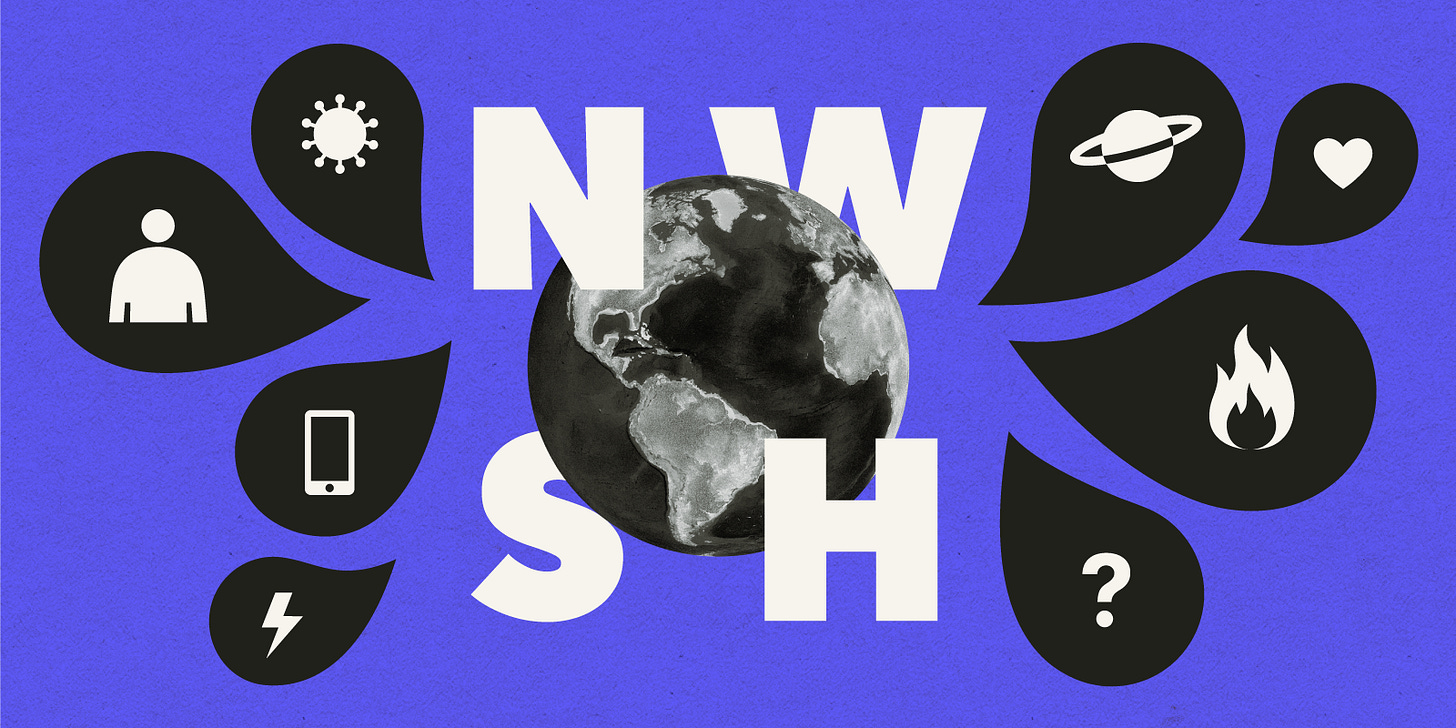Welcome to the mid-week update from New World Same Humans, a newsletter on trends, technology, and society by David Mattin.
If you’re reading this and haven’t yet subscribed, join 22,000+ curious souls on a journey to build a better future 🚀🔮
🎧 Listen to New Week! 🎧
As you may have noticed above, this instalment of New Week comes with something added. Across the last few months many of you have written to ask me to record these newsletters as a podcast.
Starting from this week, every instalment will come to you in both text and audio form. To hear the podcast version simply scroll up and hit Listen Now.
I’ll be adding the podcast to Apple Podcasts and Spotify ASAP, too.
Happy listening!
🙌 To Begin
I put this newsletter on pause last week, and headed to the English coast with my family.
We picked the right week to be by the ocean. The UK experienced a brief but acute heatwave that saw records broken across the land. Temperatures in the southeast reached 40.3C: the first time England has broken 40C since records began in 1853. I’ve never been so grateful for a cooling sea breeze.
As one climate expert put it: ‘it’s time for the UK to stop thinking of itself as a cold country’.
More on the changing climate this week, via startling new images that show the extent of glacier melt in Greenland.
Meanwhile, Meta and Apple go to war for the future of the internet. And Saudi Arabia unveils new plans for its hyper-futuristic NEOM megacity.
Let’s go!
💥 Internet wars
This week, a constellation of tech stories reveals an underlying truth: the old internet is dying, and a new one is struggling to be born.
Meta announced a coming overhaul in the way Facebook surfaces content to users. The platform will deprioritise posts shared by family and friends, and instead become an algorithmically-driven jukebox of video and other content from around the world. In other words, we need to do something about TikTok.
That’s Zuckerberg’s short-term plan for the platform that made his fortune. Meanwhile, leaked recordings from a recent Meta all-hands meeting gave a glimpse of his long-term thinking. The company is, he told staff, ‘in deep competition’ with Apple to determine the future of the metaverse.
At the heart of that war? The old battle between open and closed. Apple want One Metaverse to Rule Them All, which they control end-to-end. Zuckerberg wants to build the platform on which a million metaversal worlds can bloom:
‘They believe that by doing everything themselves and tightly integrating, that they build a better consumer experience. We’re approaching this in an open way and trying to build a more open ecosystem…We’re want to develop the metaverse in a way where you can bring your virtual goods from one world to another…It’s a very deep, philosophical competition about what direction the internet should go in.’
Finally, Google asserted its claim for consideration when it comes to the war for the future of the metaverse. The company announced that it will start a small public trial of its prototype AR glasses. No one mention Google Glass.
⚡ NWSH Take: Facebook built its business — and a philosophy of its own — on the social graph. Now, it’s overturning that in favour of algorithmically-selected entertainment. Meanwhile, the once unthinkable is happening: Google’s search business no longer looks untouchable. // Put it all together and it’s clear: web 2.0 as we’ve known for the last 15 years — built on social profiles and text-box search — is starting to fade away. Rising numbers use WhatsApp, Snap, et al, for sharing media with friends, and TikTok for entertainment. Google’s internal data shows young people are increasingly using TikTok for search, too. // So what comes next? Zuckerberg is clear: the metaverse. He’s betting the company on the idea that Meta can be the open ecosystem for this next iteration of the internet. // Less talked about is the future of search. TikTok will continue to haunt Google. But another emerging shift? One way to think about GPT-3 and other massive language models is as knowledge processors: machines that read the entire internet and spew out congruent text. As, in other words a radical new kind of search engine. Look at, for example, the new Hello Cognition, a language model-powered search engine for developers. Seen this way, the future of search is conversational virtual companions that bring users the answers, context, and creativity they need.
🌊 Rising tides
Satellite images released this week capture a supermassive glacier meltdown event in Greenland.
In the middle of July, Greenland experienced crazy heat. Temperatures averaged around 15.5C; that’s 10 degrees hotter than the average for this time of year.
The result? Massive meltdown across Greenland’s ice sheet. Between 15 and 17 July the country lost 18 billion tonnes of water; that’s enough to cover England in water roughly half a foot deep. And it didn’t stop there. A satellite from the EU’s Copernicus Earth Observation Programme captured vast streams of run-off water travelling towards the ocean on 23 July, at the height of the melting.
Scientists say the Arctic is warming twice as fast as the rest of the planet. They warn that events such as this will trigger a dark feedback loop that makes Greenland less reflective, and so more prone to melting.
Last August, it rained at the summit of Greenland’s ice sheet for the first time in recorded history.
⚡ NWSH Take: These events speak for themselves. But see this meltdown in light of a recent paper in Nature Communications that found that one in four of the world’s population, or 1.8 billion people, are now at risk of severe flooding. A full 90% live in low or middle income countries. Floods will be a mega-force that do much to shape this century. // Amid this news, how is progress on decarbonisation going? One snippet: Germany is firing up new coal plants to deal with reduced gas supplies from Russia. As NWSH has argued repeatedly, the 1.5C heating target is no longer available. It’s beyond time to start adaptation to a beyond 1.5C world. // One dimension? As waters encroach on coastal settlements, floating cities may well become the most important architectural innovation for the next 100 years. Back in New Week #80 I wrote about the UN is partnering with superstar architect Bjarke Ingels on a plan to cover the globe in just those kinds of cities.
🌆 The hard line
Saudi Arabia plans to build a hyper-futuristic city in the desert that it calls NEOM. This week, it for the first time made clear what lies at the heart of those plans.
A slick PR video unveiled The Line: a glass skyscraper that is 500 metres high and 200 metres wide, and will stretch for 170 kilometres across the northwest of the country, close to the Red Sea.
This skyscraper megacity contains ‘a series of unique communities’, and inhabitants will be able to get from one end of the city to another in just 20 minutes – presumably via some kind of bullet train. AI will manage infrastructure, micro-climate, and other environmental factors.
The result, says the Kingdom, is a carbon-neutral and smart city utopia for the 21st-century; or as they modestly put it, ‘a revolution in civilisation’.
⚡ NWSH Take: As I highlighted back in New Week #61, Saudi Arabia has been talking about NEOM since 2017. The Line is just the latest instalment in a Jetsons-esque series of promises, which include flying cars, a Jurassic Park full of robo-dinosaurs, and a giant artificial moon. Unsurprisingly, some — including NWSH — are sceptical that these plans will ever be enacted. // NEOM is best thought of at the moment as a vast PR project in megacity vapourware, intended to help rebrand The Kingdom; less repressive regime and more futuristic utopia with solarpunk undertones. The plans are the work of a raft of western consultancy and design firms, including McKinsey, Edelman, and Boston Consulting Group, who are no doubt charging several fortunes for their work. // So the underlying questions here? Why is it that the Global North’s futures and technology expertise is being deployed to whitewash the record of one of the world’s most repressive regimes? How can we unlock and enact NEOM-level innovation in the Global North, rather than the stagnation we’ve seen in atom-innovation across the last 30 years? Does anyone out there, from MBS down, really believe The Line will get built? NWSH will keep watching.
🗓️ Also this week
🤖 The CEO of McDonald’s says robots won’t be taking over the company’s kitchens any time soon. In an earnings call, Chris Kempczinski said the business continues to suffer staff shortages, but that kitchen robots ‘are not practical in the vast majority of restaurants; the economics don’t pencil out’. If you’re wondering why automation hasn’t yet liberated many humans from routine physical work, here’s one answer: we’ve pushed wages so low that it’s cheaper for businesses to keep paying people than it is to invest in automation technologies.
🏊♂️ A drone lifeguard saved a 14-year-old boy from drowning the sea in Spain. Footage from the drone shows it hovering over the boy and dropping a life vest in the water. Remotely piloted drones, supplied by a startup called General Drones, have been rolled out across beaches in Spain to support human lifeguards.
💥 Former Google CEO Eric Schmidt says the world needs an AI deterrence agreement. Speaking at the Aspen Security Forum, Schmidt likened the destructive potential of AI to that of nuclear weapons, and argued that the US and China should sign a pact that outlaws aggressive uses of the technology.
🚗 Porsche says its EVs will soon be more profitable than its petrol cars. Chief financial officer Lutz Meschke says internal projections show the profit margin on EVs will overtake that on petrol cars in around two years.
🛰 Russia says it will end its collaboration with NASA on the International Space Station in 2024. Roscosmos, the Russian space agency, says it will build its own space station and operate it independently of the US.
👨⚕️ Amazon says it will acquire the US subscription-based healthcare provider One Medical for $3.9 billion. Users of One Medical get access to a 24/7 health service via an app, as well as same or next day appointments at one of 125 offices across the US.
🧬 A new research paper says CRISPR gene editing may cause damage that promotes cancer. Published in Nature Biotechnology, the paper says CRISPR can cause loss of genetic material that damages the genome, and may lead to cell mutations. The authors say more research is needed.
🚕 Chinese tech giant Baidu will roll out 100,000 robo-taxis across the next few years. The company unveiled its new Apollo RT6 self-driving car this week. Currently, Chinese law requires the presence of a safety driver in all self-driving cars. Meanwhile, the CCP tightened laws that force ride-hailing companies to share their data with the government. In Algorithms with Chinese Characteristics I wrote on the CCP’s push to create a new form of AI-fuelled techno-authoritarianism.
🌍 Humans of Earth
Key metrics to help you keep track of Project Human.
🙋 Global population: 7,963,684,932
🌊 Earths currently needed: 1.8142855076
💉 Global population vaccinated: 61.5%
🗓️ 2022 progress bar: 57% complete
📖 On this day: On 29 July 1987 British Prime Minister Margaret Thatcher signs an agreement with French President François Mitterrand to build a tunnel underneath the English Channel to connect their countries.
The Future is Ours
Thanks for reading this week.
The war to own the future of the internet is just getting started. The Zuck, Apple’s Tim Cook and others will duke it out in a process that will see new technologies collide with the age-old impulse towards power. A classic case of new world, same humans.
This newsletter will keep watching, and working to make sense of what it all means for our shared future. And there’s one thing you can do to help: share!
Now that you’ve made it to the end of this week’s instalment, why not forward the email to someone who’d also enjoy it? Or share it across one of your social networks, with a note on why you found it valuable. Remember: the larger and more diverse the NWSH community becomes, the better for all of us.
I’ll be back on next week. Until then, be well,
David.
P.S Huge thanks to Nikki Ritmeijer for the illustration at the top of this email. And to Monique van Dusseldorp for additional research and analysis.













